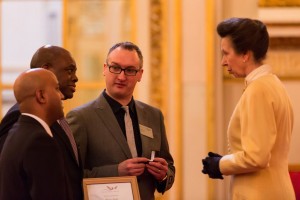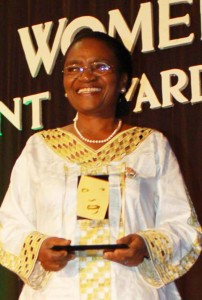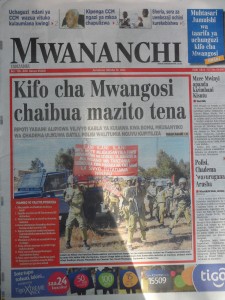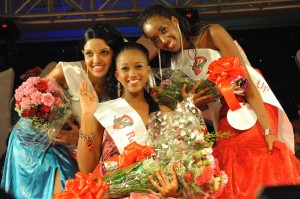The Tanzania Communications Regulatory Authority (TCRA) has banned the Morogoro-based radio station Imaan FM and the Mwanza based Neema FM Radio for six months for broadcasting inflammatory statements that “violated the law and broadcasting ethics”. The Authority also fined Clouds FM Radio TShs 5 million for holding a discussion that “promoted and supported homosexuality” in the country through its morning programme, Power Breakfast.
Category Archives: Miscellany
OPENING DOORS
Tanzanian Affairs co-editor Donovan McGrath was invited to Buckingham Palace on 11 March to receive a Butler Trust Award from Princess Anne in recognition of his work with Radio Wanno, Wandsworth Prison’s community radio station. Together with fellow radio tutor Simon Sujeewon and project manager Kevin Field, Donovan runs a Radio Production course for inmates. This course is oversubscribed and has the best attendance record of any course at the prison.
The prisoners learn how to use sophisticated audio editing software and develop their literacy and IT skills while writing scripts for radio programmes. Many have barriers to learning, such as dyslexia, language problems and learning difficulties, or are tackling addiction, but at the project they find friendship and support as well as learning new skills. Students have credited the programme with giving them ‘endless opportunities’ and changing their mindset.
AWARD FOR PROF. MWAIKAMBO
Britain Tanzania Society’s veteran Vice-President Prof Esther Mwaikambo has been awarded the 2013 Dr Martin Luther King Jr Drum Major for Justice award at a ceremony in the US Embassy in Dar es Salaam. She is a Senior Professor of Paediatrics and Child Health at the Hubert Kariuki Memorial University in Dar es Salaam and was the first Tanzanian female medical doctor. Her career spans over 40 years in public service and carries with it a longstanding concern on health issues, worker-patient relationships, ethical conduct of health personnel, promotion of human rights in the delivery of the services and most importantly; a good clinical practice. She has published more than 100 research papers in the areas of medicine and maternal care and has the distinction of having founded and served as the Chairperson of the Medical Women Association of Tanzania from 1997 until 2006.
PRESIDENTIAL “TWIPLOMACY”
According to a report in the Citizen on a study carried out by ‘Twiplomacy’ late last year, President Kikwete @jmkikwete is an active tweeter with an average of 2.52 tweets a day, and 26,762 followers. However, in common with most of his peers in other countries, he is not yet taking full advantage of social media to develop connections with fellow leaders. At the time of the report he followed only two people – Deputy Minister for Communication, Science and Technology January Makamba and a citizen-centred initiative called ‘Twaweza’.
The President is said to love to engage his followers, to create healthy debates and wish them good luck. Three quarters of his tweets are replies to his fellows. He also tweets, in English and Swahili, words of wisdom on current events and links to articles or websites relevant to Tanzania. According to the report, European Union President Herman van Rompuy was the best connected world leader although he only followed 11 fellow leaders. President Obama and the White House have established mutual Twitter relations with only three other world leaders: Norwegian Jens Stoltenberg, David Cameron and Russian Prime Minister Dmitry Medvedev. The governments of almost two-thirds of 193 UN member countries have a presence on Twitter: 45% of the 264 accounts analysed are personal accounts of heads of state and government, but just 30 world leaders tweet themselves and very few on a regular basis.
As of April 2013, the President’s followers had increased to 61,957, and he is now following eleven people, one of whom is the Tanzania High Commissioner to the UK, Peter Kallaghe.
CONTRIBUTORS – RECENT CHANGES
Sadly, Valerie Leach who has been writing with great skill and in a remarkably all-embracing way on Business and the Economy has had to resign due to pressures of her other work as a Councillor on Camden Council. We now need to find someone to fill the gap.
For this issue, we have asked Paul Gooday to write about the first part of the last four months and James Pringle about the second part. Paul Gooday recently joined the Department of Business Innovation and Skills in the UK. He was brought up in Swaziland and South Africa and studied Economics at the University of London. He is keen to play a role in the development of Sub-Saharan economies.
James Pringle recently returned to the UK after a decade working in Tanzania, latterly in the media. He now works as a development analyst for a UK-based consultancy. James will be taking on a new role with TA, as Editorial Assistant. His primary function will be to coordinate the contributors’ sections, to lighten the load on the Editor.
Happily Roger Nellist has come aboard to handle Energy and Minerals, for which he is more than adequately qualified. He worked in Dar es Salaam in the Ministry of Water, Energy and Minerals between 1981 and 1986 – among other things assisting with the appraisal and commercialisation of the Songo Songo gas field, developing Tanzania’s Model Petroleum Production Sharing Agreement and participating as a member of the government team in negotiations with international oil companies. He has kept in close contact with Tanzania and its energy and mineral developments since then, visiting the country more than 40 times. He continued to advise the Tanzanian Government on investment policy – especially for the extractive industries – whilst working as Special Adviser in the Commonwealth Secretariat (1986-2000) and subsequently engaged on a number of programmes relating to Tanzania as part of DFiD’s growth and investment work (from 2001 until his retirement in 2012).
In October 2004 Roger received a special Presidential Award from President Mkapa in recognition of his contribution over two decades to the realisation of the Songo Songo gas-to-electricity project. In March 2013 he presented a paper to a joint session of the UK All Party Parliamentary Groups on Tanzania and Extractives on the role extractives can play in Tanzania’s future development.
THE DEATH OF A JOURNALIST
Prominent Channel Ten TV reporter Daudi Mwangosi (40) was killed on 2nd September while a demonstration he was covering in Nyololo Village in Iringa region was being dispersed by police, attracting widespread concern and international condemnation.
A joint committee formed by the Media Council of Tanzania (MCT) and Tanzania Editors Forum (TEF) to probe the circumstances that led to his death released its findings on October 8. At the press conference, MCT Secretary General Kajubi Mukajanga said evidence proved beyond reasonable doubt that the police had deliberately and consciously intimidated Iringa-based journalists covering Chadema activities at Nyololo Village.
“The investigation was independent and was not meant as a police inquiry or judicial inquest, but as an honest documentation of the state of affairs surrounding the first ever killing of a Tanzanian journalist on duty,” Mr Mukajanga said, “Generally, this committee – based on the evidence collected in the region – concludes that there was a tense and suspicious relationship between the two sides. Mwangosi was killed in cold blood in the hands of the police”. The committee made field visits and conducted interviews with journalists based in Iringa, Chadema officials and eye witnesses. Evidence collected included video clips, still pictures and publications, and broadcast materials from media organisations.
To support the allegations of the “tense and suspicious” relationship Mukajanga noted that, in November 2011, Iringa-based ITV reporter Laurean Mkumbata was brutally beaten and his working equipment destroyed in front of the Iringa Officer Commanding the District. “In similar incidents, the committee has learnt that towards the end of February 2011, Iringa-based journalists were mistreated during the official visit of Vice President Mohamed Gharib Bilal.” Mukajanga said that, Iringa journalists were denied accommodation in hotels, a situation that forced them to sleep in a bus they were travelling in.
Meanwhile, a Special Committee was set up by Minister for Home Affairs Dr Emmanuel Nchimbi, under Judge Stephen Ihema, which also reported in early October. The committee established that there was excessive use of force by police, but ruled this out as the cause of the death of Daudi Mwangosi. The committee was, however, unable to reveal what caused the death of the journalist as the case was already pending in a court of law.
A ‘Daudi Mwangosi Fund’, aimed at taking care of journalists in trouble due to their working environment, is being set up.
MPEMBA EFFECT-20,000 SOLUTIONS!
The London Times has reported on the results of the Royal Society of Chemistry’s offer of £1,000 to anyone who can explain the counterintuitive Mpemba effect on freezing hot water (described in TA 103). But the paper said that there was still no real solution. The Society had been swamped by the number of responses it received and had had to take on extra staff to cope with the rush. They received more than 200 responses from Croatia alone; 7,000 from the US; 800 from Britain; 880 from China and four from Afghanistan!
One reply said poetically:
‘To consider Mpemba, you’ve got to remember,
no matter our clever, well seasoned capers,
we’re still plum outmatched about liquids and vapours.’
The Society has decided to ask people to vote on which of the solutions offered they consider to have been the best. Times readers were recommended to visit the Society’s website for details.
A TALE OF TWO MUSEUMS
On the 13th anniversary of Mwalimu Nyerere’s death on October 13, the Citizen published an article by Saumo Mwalimu commemorating the first President’s time living in Magomeni Usalama in Dar es Salaam and later in Butiama, Mara region.
Extracts from the article:
‘In a not-so-secluded alcove right in the middle of the city is a building whose walls could speak volumes about the founding of this nation. Located a mere four kilometres from the heartland of Dar es Salaam, an ancient structure stands tall, its national flag pulsating to the beat of a gentle city breeze. When visitors descend on this whitewashed building they are left without any doubt that it is an important landmark. The national livery, in splendid yellows and greens and blues and blacks stands ready to welcome guests. There is also the giant placard outside the property which reads in Kiswahili: “Makumbusho ya Kumbukizi ya Mwalimu Julius Kambarage Nyerere”… This rather verbose description lets visitors know the site is a tribute to the life of the founding father of Tanzania.
As monuments go, it is a rather humble abode. It is however perhaps a fitting memorial to the legendary statesman, who is remembered for championing egalitarian causes that saw the promotion of Ujamaa, a mode of African socialism that sought to put economic and social power in the hands of the masses…. However, the building has never been good at attracting guests despite its ties to a man whose life is intrinsically linked to the history of the nation. Passersby often cast sidelong glances over the gate as they go on their way; as if to try and sneak a peek inside without having to actually go in.
Mwalimu Nyerere lived in this house after he quit his teaching post at St Francis College (what is now known as Pugu Secondary) to take up full time the cause of Tanganyika’s independence, according to curator Ms Victoria Bache. “In this house Mwl Nyerere hosted meetings of the Tanganyika African Association and (its successor) the Tanganyika African National Union (TANU),” she said, pointing out that the building is testament to the history of the struggle for independence in Tanganyika.
After he had left his job at St Francis, Mwl Nyerere moved in with other political activists but these new dwellings were deemed perilous for a man of his stature. He subsequently moved to Maduka Sita in Magomeni, where he resided in “Shop Number Four” according to Ms Bache. He was given the Usalama plot by one Sheikh Abeid Karuta, where he built from scratch and moved into his new home in January 1959, two years before independence in 1961. Mwalimu stayed at the complex for only eight months. He was moved to Sea View after he became the chairman of TANU.
Despite its rich history, the Usalama museum has had a tough time drawing in foot traffic since it officially began operations early in 2012. according to its curator. “It’s hard to blame anyone for this,” she said, adding that very little had been done to promote the site. From March to November 2012 the monument and museum brought in a total of TShs 93,700 from just 163 visitors. Entry costs TShs500 per person. The curator admits that there is not much to see in the museum. The few items on display include several family beds that Mwl Nyerere owned at some point, cookers, a radio, some medals, sofa sets and bathroom fixtures.
Very few of the original fixtures have survived the years of neglect. Most have been sold off and some are in the hands of Mwalimu Nyerere’s family. “I’m doing my bit to keep this place going but I can not do it alone” she said.
In Butiama
As the Dar museum struggles, business is brisk at its twin in Butiama, Mara region. The number of visitors there is picking up according to Curator Emmanuel Kyondo. Established in 1999, the centre receives around 9,000 visitors every year, all this despite the fact that it is located 48 kms from Musoma and a full 180 kms from the city of Mwanza. Visitor numbers might be on the rise but many more potential tourists are put off by the lack of suitable lodging facilities in Butiama, Kyondo said. “That’s a big hassle; the lack of proper hotels and lodges. Many visitors would have to drive in, then drive back out to Musoma where there are nicer and more reliable hotels and guesthouses” Kyondo added.
MEANING IN MISCELLANEA
This edited version of an article serves as an introduction to an MSc in African Studies (University of Oxford) dissertation entitled “Meaning in Miscellanea: The Social Value of Books in Stone Town, Zanzibar” that was submitted in June 2012. For further discussion and enquiry please contact Jono Jackson via the editor
Nearly half a century since the English Club closed its doors, remnants of its library can be found in the same room of the same building that once housed this bastion of English society abroad.
During the era in which Zanzibar was a British Protectorate, its library was central to its members’ leisure and learning; but within the building’s current incarnation as the Africa House Hotel, the remaining books stand in cabinets inaccessible behind a locked door. The numerous cardboard boxes within reveal that the once-active library has become a storeroom, and it is through glass panes the books’ spines relate their titles and authors. Once bright, thorough, and visited daily, its current state is that of a neglected and mildewed miscellany.
Evelyn Waugh stayed at the English Club in the 1930s, and mentioned in Remote People how he went up to the library daily to read and make notes on local history. He wrote that ‘the ink runs in little puddles of sweat that fall on to the page; I leave hot thumb-prints on the history-book. The plates have all come loose and the fan scatters them about the library.’
This study is rooted in the notion that the same object can be admired or rejected, and the objects in question are English-language books that exist in various forms and locations throughout Stone Town, Zanzibar. The ways in which people respond to and use meanings have material, social, and cultural consequences for themselves and those meanings. It is proposed that books can inhabit numerous nuances of meaning and value depending upon the web of wider social relations that surround their location in time and space.
Three categories of English-language books are identified for the purpose of this study: Artifactual; Second-hand; and New.
The Artifactual are those of the English Club library that still exist within the Africa House Hotel. Remnants of this library are also found in curio shops in Stone Town and offer a fascinating insight into the reading habits and interests of those who are long-gone yet evidence of their presence remains.
Second-hand books are worthy of consideration as significant objects within the landscape and social fabric of Stone Town. Their origin and destination are largely the Western consumer, whilst their circulation is facilitated by Zanzibari booksellers. Notions of value and meaning can be extrapolated as a result of the encounter between local practices and ideas with Western forms.
New books sold in Stone Town are predominantly priced above the financial capabilities of most Zanzibaris. Whilst reading is not as essential to the human system as eating or sleeping, the interplay between the concept of reading as nourishment for the mind and yet not essential to survival suggests that perceptions of books as valuable commodities are blurred.
If books are pre-eminent as vehicles for information and education, and a source of culture and recreation, then a discussion of the presence of such a large number of books that serve transient tourists contributes to the stereotypical and outdated, yet created and maintained, societal differences between the Western, literate and wealthy world, and the Third, illiterate and poor world.
Perhaps the Swahili proverb ‘Elimu ni maisha, si vitabu’ (‘Education is life, not books’) informs a difference in social mores, as Zanzibaris might not consider books a means to an end and are not imbedded in the notion of lifelong learning or reading for pleasure. The impact of books donated from Western agencies is also questioned insofar as their effects contrast with their intended purpose.
Books are shown to be potent objects of analysis, especially as Zanzibar possesses a complex history of cultural exchange. Exploring the book as an object that possesses a cultural biography enables the reconstruction of human interactions and variants of meaning and value that can inhabit the same object as perceived by different people, all the while entangled within the history and society of Stone Town.
Jono Jackson recently graduated with an MSc in African Studies from St Antony’s College, University of Oxford. He also studied Swahili & History at SOAS which included a term on Zanzibar. He has travelled extensively throughout Tanzania, and was a contributor to the 2nd Edition (2009) of the Footprint Travel Guide to Tanzania.
NEW MISS TANZANIA
Glitz and glamour were reported to have filled the Blue Pearl Hotel recently as Brigitte Alfred from Sinza was crowned the new Miss Tanzania for 2012 in a hotly contested final.
Brigitte (centre) beat 28 other contestants to win a Toyota Noah and TShs 8 million. Eugene Fabian (left) from the Lake Zone emerged as the first runner up, and received TShs 6 million while the third place went to Edda Sylvester (right) from Temeke, who got TShs 4 million.
“I’m so happy and excited for the award, I promise not to let Tanzanians down in the Miss World event,” said the happy new queen as she stood in front of her grand prize. Brigitte is the eighteenth contestant to take the Miss Tanzania crown since its re-inception in 1994.




